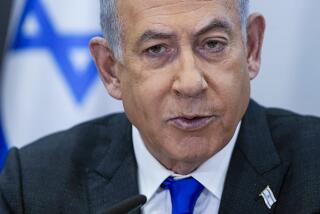Sharon to Hold Talks With Bush
- Share via
WASHINGTON — Israeli Prime Minister Ariel Sharon plans to visit Washington early next month to discuss a new U.S. peace initiative with President Bush and Secretary of State Colin L. Powell, the White House announced Wednesday.
Sharon’s trip, scheduled for Dec. 3 and 4, follows Powell’s presentation this week of a U.S. policy on the Middle East that seeks a careful balance in America’s approach to Israeli and Palestinian positions.
Although there were no new proposals in Powell’s address Monday in Kentucky, Israel and some of its American supporters grumbled that the speech could signal renewed pressure on the Jewish state to ease its tough response to the 14-month-old Palestinian uprising.
Sharon had been expected to confer with Bush on Nov. 11, when both were scheduled to attend the opening of the U.N. General Assembly in New York. But the Israeli leader canceled his trip because of continuing Israeli-Palestinian violence.
Before Sharon visits in December, U.S. envoys William Burns and Anthony C. Zinni will travel to Israel and the Palestinian territories in an effort to revive a cease-fire and renew the peace process, which has been in tatters since September 2000.
Burns is the State Department’s top Middle East expert. Zinni is a retired Marine Corps general and the former head of the U.S. military’s Central Command, which has responsibility for the Middle East. The two men met Wednesday with Bush at the White House to discuss the U.S. initiative. They will leave for the region Sunday.
In public comments, Israeli and Palestinian officials welcomed Powell’s speech--focusing on the sections that supported them--but in private, they complained that he had been too favorable to the other side. Sharon said Israel will not modify its demand that the Palestinians end the violence before peace talks can resume.
State Department spokesman Richard Boucher said Burns and Zinni will look for ways “to stop the violence, to achieve a real cease-fire, to get the parties to agree on the conditions to move to further steps.”
Asked if Powell was disappointed that neither side seems to have heeded the call to pull back from confrontation, Boucher said: “I don’t think we thought the speech was going to immediately wave a magic wand and stop the violence.”
More to Read
Sign up for Essential California
The most important California stories and recommendations in your inbox every morning.
You may occasionally receive promotional content from the Los Angeles Times.










